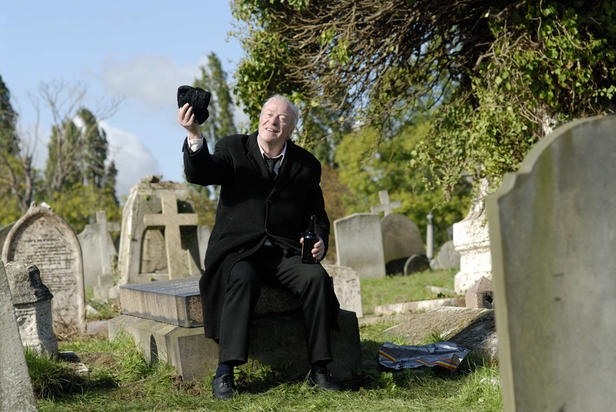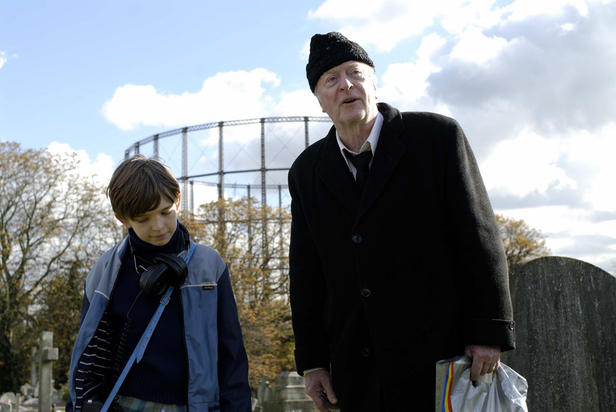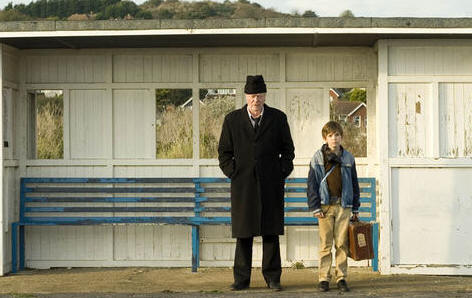Copyright ©2009 PopEntertainment.com. All rights reserved.
Posted:
May 7, 2009.
Whatever
compelled Oscar-winner Sir Michael Caine to play 80-something retired
magician Clarence in Is Anybody
There? , it's fortunate that he did. The septuagenarian Brit
takes even a simple, sentimental tale like this and, through his rich
performance and nuanced turn, gives us a real peek into a man whose life has
been slipping away from him as he enters the twilight of his life. From his
first raggedy appearance on screen, Clarence is transformed into someone
much younger as he mentors a lonely eleven-year-old boy Edward (Bill Milner)
trapped in the makeshift nursing home that his house became when his parents
started a business caring for a group of old people in the 1980s.
Clarence shows glimmers of his old self as he teaches Eddie some magic
tricks and convinces him to have a birthday party with kids he generally
shies away from he'd rather search for the ghost of the dead old folks
rather than play with his peers. But inevitably it's too late and the
ravages of Alzheimer's take control, bringing an end to Clarence and the
film.
So Caine continues to turn out sterling work (as he should after working in
more than 100 films) however one might feel about this quiet film. In
delivering such a performance, he has also mentored in real life, giving a
boost to the talented fourteen year old Milner (who also did a remarkable
job in his other film, Son of Rambow)
and support to young directors like Crowley.
Certainly what career moves Caine makes now are for fun and maybe a little
money. He's done a slew of benchmarks, from early films like
The Ipcress File and
Alfie, to Oscar winners like
Hannah and Her Sisters
and Cider House Rules.
But it didn't hurt him in joining the latest incarnation of the Batman
franchise as Bruce Wayne's butler and confidante, Alfred, in the recent two
films, Batman Begins and
The Dark Knight.
Do you believe that there's an afterlife?
I'm hoping there's an afterlife. As you get older, you hope even more
fervently. But I am still far enough away to have a few doubts [though] I'm
sure they will tighten up as you get closer [laughs]. I've noticed it
with older people.
Your wife claims to have the ability to see ghosts. Is there a story that
you have that she experienced that you can talk about?
No, not really because I don't discuss it. It's one of those things where
she believes in ghosts and I don't and we never talk about it. We never talk
about it. I'm sorry. We just don't talk about it. I hope she's right.
 Why?
Why?
Well, it'd be fun, wouldn't it? Something is better than nothing.
You seem like someone who doesn't have the word "retire" in your
vocabulary. How do you do it?
I just enjoy what I do. You have to remember; when I started out I was an
amateur actor, amateur meaning "to love." I like what I do and enjoy the
process of filmmaking; provided this is the situation that I'm in that I
have complete and utter choice of where, what, why, when, how and with whom.
That's what happens to me now. I don't work for a living. I just work in
order to improve myself as an actor which is what I've always done. I've
never been competitive with other actors. I've been competitive with myself
and I'm my own worst critic, a terrible critic I am, and unless I get
something right, I feel very unhappy. But with this picture I couldn't have
done any better than I did. There are probably a dozen other actors who
could've done it better than I did, but I couldn't have done it better. So
I'm very happy about what I've done.
What excited you about playing this angry senior citizen?
The depth and range of it. You go through every emotion and so does the
audience. If we do it right, we should make you roll with laughter at one
point and cry your eyes out at the next. That to me is the epitome of an
actor's job, to get the most extreme emotions out of you with the most
reality. I love the relationship with the boy. It's sort of like a hill. I
lead him up a hill into his childhood and he leads me down a hill to my
death.
Did you visit any nursing homes or want to spend any time in one for the
role?
No, I didn't. I knew all about them. My mother was in a nursing home, but
not like that. My mother was in a very luxurious nursing home. But I did see
a lot of people like that. People, when they get older, get infirm and do
strange things. The great thing about it was that I'd known all those actors
for 50 years [who played the nursing home inhabitants] like Barbara Harris
who was in Dirty Rotten Scoundrels
with me. I've known Leslie Phillips all my life, and Sylvia Syms [they play
Reg and Lillian, two of the nursing home residents]. I was looking at them
and didn't know what they had turned into when they had become old. Then, I
saw it. They had become old just like everyone else and it was fascinating.
Here you've got the challenge of working with a younger actor in Bill
Milner. Did he give you a run for your money?
Oh, boy, did he! Bill is a very wonderful, natural actor. He's never had
theatrical training and so he didn't have to get rid of all those tricks for
when you act in front of a camera like a stage actor. I was a stage actor
for years. He's very professional and, of course, he has an incredible
advantage over a lot of other child actors. Bill doesn't have a theater or a
stage mother. She's not acting out her failed fantasies through her son or
daughter. She's a very, very nice, very, very educated woman who's quite
surprised by his choice. I think that he was found in the school amateur
dramatic society and not in a drama school.
 He
reminds me of the talented Freddy Highmore, the young British actor who was
in Neverland
with Johnny Depp.
He
reminds me of the talented Freddy Highmore, the young British actor who was
in Neverland
with Johnny Depp.
Oh, yeah, I remember him. He's very self-possessed and so is Bill.
Journalists ask if I gave him any advice and I said, "No. He didn't need
any. He could do it."
Did Bill give you any advice?
Oh, yeah, he'd give me advice all the time [laughs]... He didn't
[really] give me advice but we were very lucky because without a great
little boy. Of course, the picture was in the toilet.
You've never had to worry about losing your career over the years, but
your character is someone who did. How did you draw on those observations,
not having experienced them?
Well, I've known so many people like him in my life. I worked in repertory,
and if you're an old character actor working in repertory, you were working
for ten pounds a week and you're him. I've learned from dozens of those
[people]. I like old actors, though. They're funny.
To see you go from the sophisticate in
Sleuth
to this character... There are those little details that you pick up on
little mannerisms and looks. How do you make those choices?
Well, they're just a guy. It's just observing people of that age. I mean,
I'm nearly that age. I reckoned that he was about 84 or 85. I'm 76. I've
just done another part where I've played an older man called
Harry Brown. The picture is
about an old man who lives in the projects and becomes a vigilante when they
kill his friend. What happens to me is that I keep getting made down instead
of made up when I go into makeup in the morning. Instead of trying to make
me look the best that I can, they tried to make me look the worst that I
can. So now I'm looking for a movie where I get made up and it's not
Batman, because
Batman is a bit of a ways
away, but something else where I get made up.
Do you ever get sentimental, looking back on your younger self in either
film or photos?
No. I never look back at all. All of my sentiment and emotion goes into my
family. I'm an extremely family oriented person and I have a very, very
happy family life. That doesn't just include blood relations. I have friends
who are close to me. But one of the things for [me with] this movie was that
one of my closest friends had Alzheimer's while we were doing this film. So
I knew exactly what it was because I had lived with Alzheimer's for five
years. Though not like his closest friends or family, I knew the stages and
what happened. In one case, it was a bit scary doing it, but I did know what
I was doing on a daily basis.
What are some of the films that have been most memorable for you in your
long and distinguished career?
Well, films are memorable for different reasons.
Zulu, because it was my first
speaking part where I had more than 10 lines.
The Ipcress File was the
first time I had my name above the title.
Alfie opened a market for me
in America. It goes right through to films like
Dirty Rotten Scoundrels,
where I made a very funny film, a very happy film, and for that location
they gave me a villa in the south of France for three months. I'm still
waiting for another movie like that. I've never gotten it. But the films
that I loved making the original
Sleuth.... Well, I loved making the second
Sleuth. We got slaughtered
for that, but I still loved making it. And, [there's]
The Quiet American,
Little Voice, and
Hannah and Her Sisters. I
loved working with Woody [Allen] and love New York, so I was very happy with
that. I thought that Hannah and Her
Sisters was Woody's warmest film with sort of Thanksgiving and
everything. It was funny then because I would have a line of dialogue in the
picture, I'd say, "Well, you know me, I'm not fond of kids and I don't like
the country." Mia [Farrow] would always say, "He's right and he's saying
that to me. It's personal to me." All these things, I kept saying lines to
Mia and she'd say, "That's another one. You see?" It was very funny.
 In
further reviewing your career, what are some of the things that you realize
you accomplished in terms of craft, accents, or whatever?
In
further reviewing your career, what are some of the things that you realize
you accomplished in terms of craft, accents, or whatever?
I managed to get to a stage where I imagine and I've never taken drugs
if you take a drug of your choice, you get some ecstatic feeling. I have a
situation now [that in [various] takes where I know I've absolutely nailed
it. I know. I think that's why I'm still doing it because that's the
drug I need. The director says "Cut" and nobody even says, "Lets try it
again." They say, "We're over here" and they just walk away because you
can't do it again. That for me is what I've learned to do.
How did you avoid drugs all your life and these years in this business?
Well, they weren't there when I was young. It was alcohol. We were all
drunks. All the British actors of my time were all bombed out of their
minds. I remember seeing a Shakespeare play I forget what it was with
Trevor Howard and a very old British actor who's a very famous drunk called
Wilford Lawson. He was always pissed. I saw a matinee, and they came on
both were very drunk in this Shakespeare play. A member of the audience
shouted out, "You're drunk." And Trevor Howard said, "If you think we're
drunk, wait until you see The Duke of Buckingham."
You've never been drunk and done a role?
Oh, no, I never drink at work at all. Nothing. I'm very professional. I
mean, I can drink. Well, I used to drink vodka like the lads and [go to]
discos and piss [off] and all of that stuff, but I mean I'm very, very
family oriented. I'm a big cook and a good connoisseur and I only drink very
good red wines now.
You've been married for so many years; how are you and your wife Shakira
alike and different?
My wife and I are alike in that we're both Pisces and we're both slightly
off-the-wall and very gentle people. But we're at different ends of Pisces
so she's very, very gentle and I'm the other end, into some serious [stuff].
I forget what it is, but I can be quite tough for a Pisces.
You've said that you met her on a TV commercial.
Well, I didn't meet her, but I saw her on the television, yeah.
And you're still together after all those years.
Yeah, 38 years together, which shows you that I was right, doesn't it? I've
seen thousands of beautiful girls on television commercials. Why I went nuts
over this one I don't know. We never watched television in those days. But
my best male friend and I, we just stayed in one night from the discos and
getting bombed and all of that, and we just had a quiet night in. I cooked
some dinner and then we watched the television we were just going to have
a quiet night, get some sleep.
Of all the many actors you've worked with, who have you bonded with the
most and stayed in touch with the most?
Sean Connery. That's a bit of a cheat really, because Sean and I were
friends anyway before we made the picture. Actors movie actors don't see
each other again. I've worked with Roger Moore, too, and he's another one
that I'm close to. But even for those... I live in England. One lives in
Switzerland and the other lives in the Bahamas. So I never see them. You
never see each other. My circle of friends are not actors at all. None of
them are actors, really, because they're not available. They're always off
somewhere. One of my friends was my tailor, one of my best friends, who died
of Alzheimer's. Dougie Hayward. Another close friend is Leslie Bricusse
who's a composer. He's always where he wants to be and he lives near me in
England. There's the photographer Terry O'Neil and a guy called Johnny Gold
who had the big London discotheque, Tramp, in the '60s where I used to go
and drink vodka. So you bond with actors and get on with them very well, and
then, you don't see them. If you're a leading actor you don't work with
another actor. You work with a lady, if you see what I'm saying.
How did you bond with James Bond, so to speak? Did you two meet outside
of work?
Oh, yeah.
What was the connection that made you such good friends?
Well, we always were. When I met him, Sean Connery was a chorus boy in
South Pacific. What had
happened was that [its producers] came to London to do
South Pacific and had to have
all these American sailors, big tough sailors, singing "There's Nothing Like
a Dame." They did auditions with London chorus boys who were not really very
butch. They had all these little, skinny guys, and it looked ridiculous when
they sang "There's Nothing Like A Dame." So the producer went around to all
the gymnasiums and Sean was like Arnold Schwarzenegger. He was Mr.
Edinburgh. He was going for Mr. Great Britain and Mr. World. He was a big
weightlifter, a great big guy. The opening night of
South Pacific was a Thursday
and I went to a party on the Saturday night and met him there. He was 24 and
I was 22. That's where we met.
What still excites you about the parts you do?
The degree of difficulty and the people that I'm working with. For instance,
I like to work with young directors, and I had seen the two films that John
[Crowley] made [Intermission
and Boy A]. I made
another picture [recently], Harry
Brown, and saw the one picture that the director Daniel Barber
made. I think it was called The Tonto
Woman. He got nominated for the [Best Live Action Short] Oscar
in 2008 for it and now, this is his first feature. So I like to do that. I
mean, even Christopher Nolan was a young director with only two small movies
when we did Batman Begins.
Is there a certain kind of fun when you do big tentpole movies like
The Prestige
or Batman?
Oh,
yeah, it's wonderful. I love doing those [kinds of films]. I love working
with Christopher Nolan. I think he's a new David Lean, Christopher is. He's
extraordinary. I've seen everything he's ever done. I've worked with him on
three pictures and I just think he's the most extraordinary director and has
an incredible imagination. Remember, he writes these scripts.
CLICK HERE TO SEE
WHAT MICHAEL CAINE HAD TO SAY TO US IN 2010
Email
us Let us
know what you
think.
Features
Return to the features page.